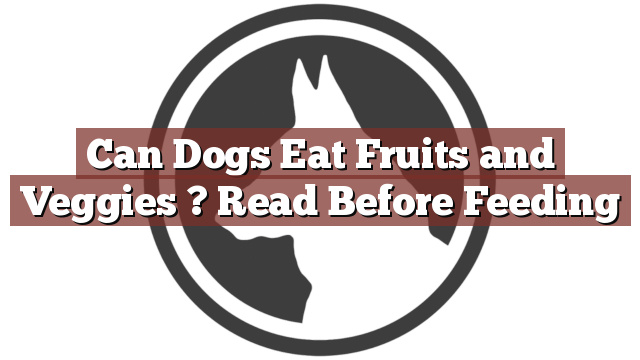Understanding Your Dog’s Dietary Needs
As a responsible pet owner, it is crucial to be knowledgeable about your dog’s dietary needs. A balanced diet plays a vital role in maintaining your canine companion’s overall health and well-being. Dogs are primarily carnivorous animals, which means their bodies are naturally designed to consume and digest meat. However, this does not imply that they cannot benefit from other food sources, such as fruits and vegetables.
Before introducing any new food into your dog’s diet, it is essential to consult with your veterinarian. They can provide you with specific guidelines based on your dog’s age, breed, size, and any existing health conditions. This will ensure that you make informed decisions about what to feed your beloved pet.
Can Dogs Eat Fruits and Veggies? Read Before Feeding
Can dogs eat fruits and veggies? This is a common question among dog owners who are seeking to diversify their pet’s diet. The answer is yes, but with certain considerations. While fruits and vegetables can provide nutritional benefits to your dog, they should never replace the main components of their diet, which are proteins from animal sources.
When incorporating fruits and vegetables into your dog’s meals, it is crucial to select options that are safe and appropriate for them. Some fruits and veggies are toxic to dogs, so it is crucial to familiarize yourself with what is safe and what is not. For instance, grapes, raisins, onions, garlic, and avocados should be strictly avoided as they can be harmful to your furry friend.
Pros and Cons of Feeding Fruits and Veggies to Your Dog
Feeding fruits and vegetables to your dog can offer several benefits. Firstly, they are a natural source of essential vitamins, minerals, and fiber, which can support your dog’s overall health. Additionally, they can provide added hydration and help with digestion. Some dogs even enjoy the taste and texture of fruits and vegetables, which can contribute to their overall satisfaction.
However, as with anything, there are also potential drawbacks to consider. Some dogs may have allergies or sensitivities to certain fruits and vegetables, leading to digestive issues or other health problems. Additionally, overfeeding fruits and vegetables can cause an imbalance in your dog’s diet, leading to deficiencies in other essential nutrients, such as protein.
Conclusion: Making Informed Choices for Your Dog’s Nutrition
When it comes to feeding your dog fruits and veggies, it is crucial to strike a balance. While they can be a healthy addition to their diet, they should never replace the main components of their meals. Always consult with your veterinarian before introducing any new foods to ensure that they are safe and appropriate for your dog.
Remember, each dog is unique, and what works for one may not work for another. Pay attention to your dog’s reactions and consult your veterinarian if you notice any adverse effects after feeding them fruits or vegetables. By making informed choices and prioritizing your dog’s nutritional needs, you can contribute to their overall well-being and happiness.
Thank you for taking the time to read through our exploration of [page_title]. As every dog lover knows, our furry friends have unique dietary needs and responses, often varying from one canine to another. This is why it's paramount to approach any changes in their diet with caution and knowledge.
Before introducing any new treats or making alterations to your dog's diet based on our insights, it's crucial to consult with a veterinarian about [page_title]. Their expertise ensures that the choices you make are well-suited to your particular pet's health and well-being.
Even seemingly harmless foods can sometimes lead to allergic reactions or digestive issues, which is why monitoring your dog after introducing any new food item is essential.
The content provided here on [page_title] is crafted with care, thorough research, and a genuine love for dogs. Nevertheless, it serves as a general guideline and should not be considered a substitute for professional veterinary advice.
Always prioritize the expert insights of your veterinarian, and remember that the health and happiness of your furry companion come first.
May your journey with your pet continue to be filled with joy, love, and safe culinary adventures. Happy reading, and even happier snacking for your canine friend!

